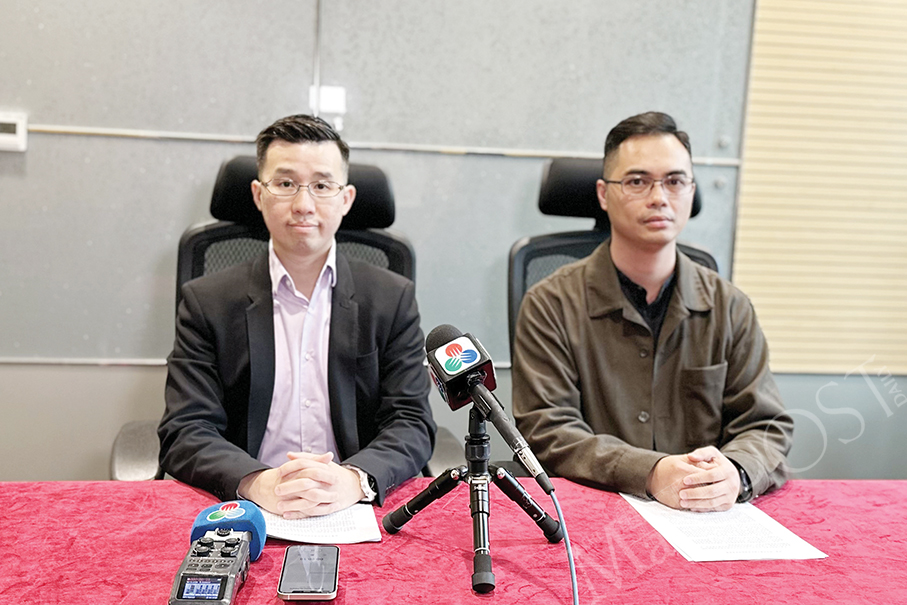2024-05-09 03:21 BY Yuki Lei Comment:0
Several civic leaders voiced their concern yesterday about senior citizens living alone, and the Social Welfare Bureau (IAS) said that it identified in 2020-23 about 330 elderly persons and ageing couples living alone.
According to the bureau, it continues to cooperate with social welfare organisations in providing diversified services and support to living-alone senior citizens and elderly-couple households, while also providing them with a range of cultural, recreational, sporting and social activities, via subsidised elderly community centres, to help them expand their social network.
The government-appointed Central District Community Service Consultative Council invited yesterday IAS Social Solidarity Department Chief Choi Sio Un and Kam Kit Leng, who heads the bureau’s Elderly Service Division, to its fifth plenary meeting of this year at the Activity Centre of Patane Municipal Market, briefing its members on IAS measures to identify and recognise “hidden” senior citizens and its related support work. Following the end of the about one-hour closed-door meeting, a press briefing hosted by the council’s deputy convener Lei Chong In and fellow member Tam Chan Lam was held.
Lei quoted two senior IAS officials as saying that the bureau, in conjunction with day centres for elderly people and teams providing home care services for seniors, also provides daily living and nursing care to frail elderly persons with special care needs, adding that there are also specialised services such as the “Peng On Tung” Tele-Assistance Service, the “Senior Care Network” and the “Clusters Supporting Living-alone Seniors”, providing regular visits and a 24-hour emergency paging service especially for living-alone seniors and ageing couple households, thereby keeping abreast of their living conditions and providing them with relevant support.
In terms of the “hidden elderly”, Lei pointed out that most of them are isolated from society, so there are certain difficulties for the Social Welfare Bureau to identify them, adding that the physical, mental and emotional conditions of these elderly persons are “relatively” fragile, lacking the care of their relatives and friends and, Lei added, “they do not know how to, or are not willing to, seek outside help”.
According to Lei, the bureau and social service agencies jointly identify “hidden” elderly and ageing couples in the community by visiting their homes, distributing leaflets in the community and setting up awareness-raising campaigns. Lei quoted the bureau as saying that it has also launched a string of measures, including inter-departmental cooperation, in order to proactively identify those who fail to update applications for their annual social welfare services, such as the renewal of various living allowance services. Lei also said that the bureau, at the same time, cooperates with the Health Bureau (SSM) in following up on the actual service needs of elderly people living alone who have been discharged from hospital, as well as taking advantage of new technology, such as cooperating with “Peng On Tung” (“Safe Telecommunication”), in order to monitor the conditions of elderly people and ageing couples living alone through the installation of relevant apps on their smartwatch.
According to Lei, the Social Welfare Bureau noted during the meeting that as of last year there were 703 seniors and 250 ageing couples living alone who took part in the “Clusters Supporting Living-alone Seniors”, while the total number of service users in the “Senior Care Network” programme stood at 4,411, including 2,131 elderly people living alone. At of the end of last year, the “Peng On Tung” Tele-Assistance Service had served a total of 5,140 older adults, Lei said.
Lei noted that there are about 96,000 elderly people in Macau, or 14 percent of the population, among whom about 9,000 are living-alone seniors, while Tam added that in Macau, statistically speaking, the proportion of living-alone seniors and households comprising two elderly members accounts for only 45 percent of 10,000 senior citizens, i.e., about 4,000.
In the future, the bureau will also increase the number of its outreach team visits to local neighbourhoods, update its data of the elderly on a regular basis, and launch a mobile phone app for detecting the mobility conditions of the elderly, Lei said.

Government-appointed Central District Social Services Consultative Council Deputy Convener Lei Chong In (left) and fellow council member Tam Chan Lam pose during yesterday’s press briefing after the council’s closed-door meeting at the Patane Municipal Market Activity Centre. – Photo: Yuki Lei
 China, Hungary elevate ties to all-weather comprehensive strategic partnership
China, Hungary elevate ties to all-weather comprehensive strategic partnership
 Mainlander robs 3 women at knifepoint, rapes one of them within an hour: police
Mainlander robs 3 women at knifepoint, rapes one of them within an hour: police